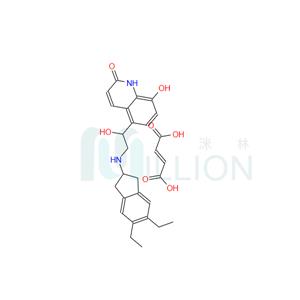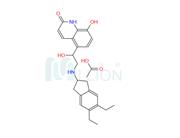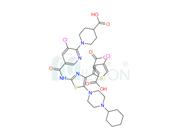General:Indacaterol Maleate is the substance for the production of indinaterol maleate inhalation aerosol prescription and indacatrogrone bromonium inhalation aerosol. Indacaterol Maleate is an ultra-long-acting β 2 adrenergic (ADRB 2) agonist with oral activity. Indacaterol Maleate inhibits NF-kB activity in a β -arrestin2-dependent manner, preventing further lung injury and improving lung function in COPD. Indacaterol Maleate is a long-acting inhaled β adrenoceptor agonist. It can keep the muscles around the lung-airway relaxed and prevent the symptoms of COPD. After inhalation, a bronchodilator can act locally in the lung.
Product introduce: It is a super-long-acting β-adrenoceptor agonist, with a pKi of 7.36 for β1-adrenoceptor and 5.48 for β2-adrenoceptor.
Function:Can be used for treating asthma and chronic obstructive pulmonary disease (COPD), and has very long action duration in vivo and in vitro. Only once a day can control the wheezing symptoms and improve the lung function of patients with chronic obstructive pulmonary disease and bronchial asthma.
Origin: Indacater0l Maleate is a β -selective adrenoceptor agonist with bronchodilatory activity, which is developed by Novartis Company. It can be used to treat asthma and chronic obstructive pulmonary disease (COPD), and it has a very long duration of action in vivo and in vitro.
Indacaterol Maleate 0l(10μM) had almost complete inhibitory effect on EFS-induced isolated human bronchial contraction, which lasted for 12 hours. Incataterol inhibited the release of IgE-dependent histidine from macrophages, and its intrinsic activity (Emax of long-acting Incataterol/Emax/IsChemicalbookoprenaline) was 1.03. Indacaterol Maleate induced the release of cAMP from airway smooth muscle, with pEC50 of 8.53 and Emax of 48%. Compared with CHO-K1 data in primary ASM cells, Indacater0l seems to have a lower curative effect.
2.Indacaterol Maleate (6.7 μg/kg/kg) inhibited 5-HT-induced bronchial stenosis, and its maximum effect was 85% in conscious guinea pigs. Indacater0l (12.5 μg/kg/kg) inhibited the bronchial contraction induced by methacholine in a dose-dependent manner, and its maximum effect in anesthetized rhesus monkeys was 85%.

 China
China



